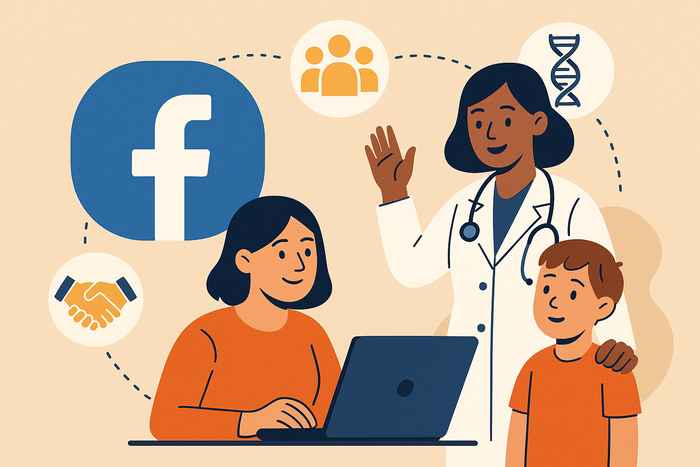Sometimes it’s parents - not doctors - who hold the answers
How a Facebook group of parents leads to new scientific insight about a rare disease.
20 May 2025

In 2020, Linn was told that her daughter has FOXP1 syndrome. This rare disease affects brain development, especially in the areas of language, learning, and behaviour. Worldwide, there were only about 250 children with this diagnosis at the time. ‘Our doctor couldn't tell us much about this condition or what it would mean for her and our future.’
Linn was recommended to read a number of scientific articles. ‘They were difficult to understand, even for me as a scientist.’ Eventually, the doctor referred her to a Facebook group for parents with a child with the same diagnosis. ‘We ended up in a completely new world.’
These tips do not always have to be scientifically proven. If it works, it works.
Practical tips
'One important thing I missed was an idea of what my future would look like,' Linn says. ‘Will our daughter ever be able to walk, talk, use the potty?’ In the Facebook group, she found information, recognition, and hope. ‘It is bizarre to see that all these children like the same type of toys, or always need to hold something in their hand to keep calm.’ She also very much appreciated the practical tips shared. She now knows she is not the only parent with these kinds of experiences. 'We know from interviews with parents that they especially appreciate the practical tips that make a parent's life bearable. These tips do not always have to be scientifically proven. If it works, it works.’
Doctors, communication scientists and patients’ association working together
Linn saw the value of this shared experience. She sought out other researchers and doctors and decided to bring structure in researching the Facebook group's knowledge. She did this together with doctors from Leiden UMC and Radboud UMC, communication scientists from the University of Amsterdam and Radboud University, and the FOXP1 patients' association. The collaboration led to a unique project in which parents voluntarily donated their data from the Facebook group to science, also known as 'data donation'.
Want to know more about data donation? Communication scientist Damian Trilling explains (in Dutch) in this video how it works, and how it can be used in research:
These insights are also valuable for doctors, as they often see only one child with this condition throughout their career.
Linn's team applied an algorithm to the shared data to analyse which topics were discussed the most. They then manually reviewed a selection of messages and spoke to parents in interviews. This gave them a more accurate picture of what families go through and how children develop. ‘These insights are also valuable for doctors, as they often see only one child with this condition throughout their career.’
Too much positivity?
The Facebook group turned out to be much more than a place to share experiences. 'For many parents, it's something to cling onto. It is often the only way they can get information in an understandable way,' Linn says. For scientists, those shared experiences from the Facebook group are a useful source for their research. However, using this kind of information as research data also carries risks. Some parents prefer to share only the beautiful moments and leave out difficult topics. This is what researchers call 'positivity bias'. For example: parents tell you that their child sleeps well thanks to certain tricks, but say nothing about tantrums. This may distort the picture of the condition. ‘That is why it is really important to compare the results with the clinical data known about this disease.’
The more experiences, the more knowledge
What is striking about the Facebook group is that parents not only share information, but also recognise or nuance each other's experiences. 'For example, a parent who is wondering if other children also have a dimple in the skin above the buttock,' Annemiek says. ‘Other parents then respond in the affirmative or in the negative, slowly making it clear whether this characteristic may or may not belong to the syndrome.’
We learned that sharing stories may be confrontational. Parents should be able to make their own choices about what they do and do not (yet) want to see.
Online diary
Because parents start posting shortly after the diagnosis, a kind of online diary is created. 'This provides a natural overview that clearly shows you how a condition develops,' Linn says. This provides valuable insights. ‘For example, when they start walking and talking, and at what age certain symptoms become apparent. Such patterns are very interesting for parents, but also for science.’
Future plans: a platform of their own
Linn hopes that one day she will be able to develop a safe alternative to Facebook. ‘A place where parents can share experiences, without worries about privacy. Where the information is automatically structured and where you can filter what you want or do not want to read.’ Because sharing knowledge can also be tough. ‘We learned that sharing stories may be confrontational. Parents should be able to make their own choices about what they do and do not (yet) want to see.’
That shared knowledge can not only help you, but also take science a step further.
Advice from a scientist and expert by experience
As a mother of a child with a rare disease but also as a scientist, Linn has clear advice for people in a similar situation: ‘Find each other, connect. You are not alone, together you know more. Parents really are the experts when it comes to their children's rare conditions, their stories make all the difference. And that shared knowledge can not only help you, but also take science a step further.’